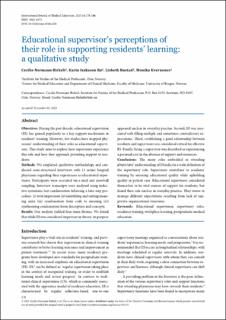| dc.contributor.author | Birkeli, Cecilie Normann | |
| dc.contributor.author | Isaksson Rø, Karin Elisabet | |
| dc.contributor.author | Rustad, Lisbeth | |
| dc.contributor.author | Kvernenes, Monika | |
| dc.date.accessioned | 2024-01-29T13:09:05Z | |
| dc.date.available | 2024-01-29T13:09:05Z | |
| dc.date.created | 2023-12-12T12:58:48Z | |
| dc.date.issued | 2023 | |
| dc.identifier.issn | 2042-6372 | |
| dc.identifier.uri | https://hdl.handle.net/11250/3114323 | |
| dc.description.abstract | Objectives: During the past decade, educational supervision (ES) has gained popularity as a key support mechanism in residents’ training. However, few studies have mapped physicians’ understanding of their roles as educational supervisors. This study aims to explore how supervisors experience this role and how they approach providing support to residents.
Methods: We employed qualitative methodology and conducted semi-structured interviews with 13 senior hospital physicians regarding their experiences as educational supervisors. Participants were recruited via e-mail and snowball sampling. Interview transcripts were analysed using inductive systematic text condensation following a four-step procedure: (i) total impression (ii) identifying and sorting meaning units (iii) condensation from code to meaning (iv) synthesising condensation from description and concepts.
Results: Our analysis yielded four main themes. We found that while ES was considered important in theory, its purpose appeared unclear in everyday practise. Second, ES was associated with filling multiple and sometimes contradictory expectations. Third, establishing a good relationship between residents and supervisors was considered critical for effective ES. Finally, being a supervisor was described as experiencing a personal cost in the absence of support and resources.
Conclusions: The many roles embedded in attending physicians' understanding of ES indicate a wide definition of the supervisory role. Supervisors contribute to residents' training by ensuring educational quality while upholding quality in patient care. Educational supervisors considered themselves to be vital sources of support for residents, but found their role unclear in everyday practice. They strove to manage different expectations resulting from lack of supportive organisational structures. | en_US |
| dc.language.iso | eng | en_US |
| dc.rights | Navngivelse 4.0 Internasjonal | * |
| dc.rights.uri | http://creativecommons.org/licenses/by/4.0/deed.no | * |
| dc.title | Educational supervisor's perceptions of their role in supporting residents' learning: a qualitative study | en_US |
| dc.type | Journal article | en_US |
| dc.type | Peer reviewed | en_US |
| dc.description.version | publishedVersion | en_US |
| dc.rights.holder | Copyright 2023 The Author(s) | en_US |
| cristin.ispublished | true | |
| cristin.fulltext | original | |
| cristin.qualitycode | 1 | |
| dc.identifier.doi | 10.5116/ijme.6544.cf18 | |
| dc.identifier.cristin | 2212355 | |
| dc.source.journal | International Journal of Medical Education | en_US |
| dc.source.pagenumber | 178-186 | en_US |
| dc.identifier.citation | International Journal of Medical Education. 2023, 14, 178-186. | en_US |
| dc.source.volume | 14 | en_US |

